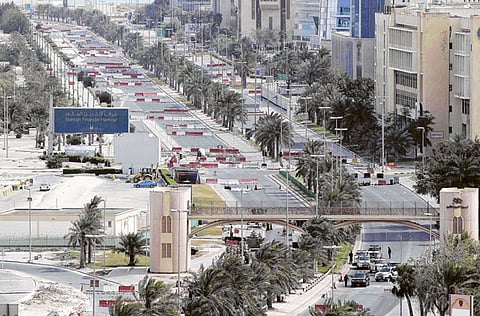Bahrain beefs up security
Police armoured carriers patrol the streets in search of troublemakers

Manama: I had never seen a gunship helicopter before, I have only seen them in movies.
I don't ever want to see one again.
All morning, three of the large Apache-like attack helicopters hovered above me, with three other less ominous helicopters also above. The small delivery truck I was lying under provided adequate cover amid sounds of gunfire.
This fruit market some 300 metres is as close to Pearl Roundabout as I dared go shortly after 8am.
For 45 minutes filled with fear, tear gas and the need to focus on what was happening around me — every sight and sound — my life came down to living like a stray cat curled up under this chassis.
I thought that maybe I should have been a mechanic — aren't they more used to this view of the world?
A month ago I had been here, hiding in a fish market as tear gas clouds swirled close to me.
In this state of emergency, blue police armoured carriers whizz by, their turret gunners traversing their weapons in search of the resistors. Resistance is futile, better instead to run — or hide like a cat.
I retreat to the parked vehicles of a limousine company for a full sensory experience; seeing the police operation, hearing the gunfire, smelling the soot, feeling the tears, touching the ground as close as I could — and speaking the truth that I have never been so afraid.
Two hours here, things have settled down — there is less gunfire, not close to me anyway. I deem it safe to try and get to a hospital for I know there must be scores of injured.
I follow my way through alleys, and meet up with some men. I tell them I want to visit Sulmaniya Medical Centre, Bahrain's biggest hospital. Too dangerous they tell me, leading me to the nearby Naim Medical Clinic. Inside, its nurses have a gaze that I have grown used to here — one of disbelief, shock, fear.
Dr Sana Yousuf tells me there are 111 injured there, that there has been shooting nearby, that other medical clinics are overwhelmed too, and that the military have taken control of Salmaniya hospital.
She says there are reports the military are coming to her clinic looking for injured people. No ambulances can transport the injured, and there are many at her centre who need more specialised care that she and her staff can offer. But they are doing everything humanly possible.
I leave, heading back to my hotel to take stock of all that I had seen and heard.
I turn a corner, turning to a blue phalanx of police officers, all armed with automatic weapons and shotguns. They raise their weapons and shout at me in Arabic.
"La arabiya," I holler repeatedly, raising my hands high above my head.
They gesture me to kneel as they approach from 50 metres.
I do, instinctively pocketing my BlackBerry. Is that a mistake, I wonder, thinking that they might feel I am drawing a weapon.
Hands behind my head
"La arabiya," I holler, joining my hands behind my head. They gesture for me to lie flat. I do.
They approach, and I am checked over.
"Gulf News, Dubai," the officer says. We chat for a minute and I invite myself to follow behind the phalanx of men, police vehicles and fire engines as they sweep the area.
They turn left, heading for the Naim Medical Clinic that I have just left.
In the car park, I see seven police officers roughly detain two medical staff for questioning at gunpoint.
"You should go," the senior officer tells me. "Go! It is for your own protection. Go! It is not safe to be here."



